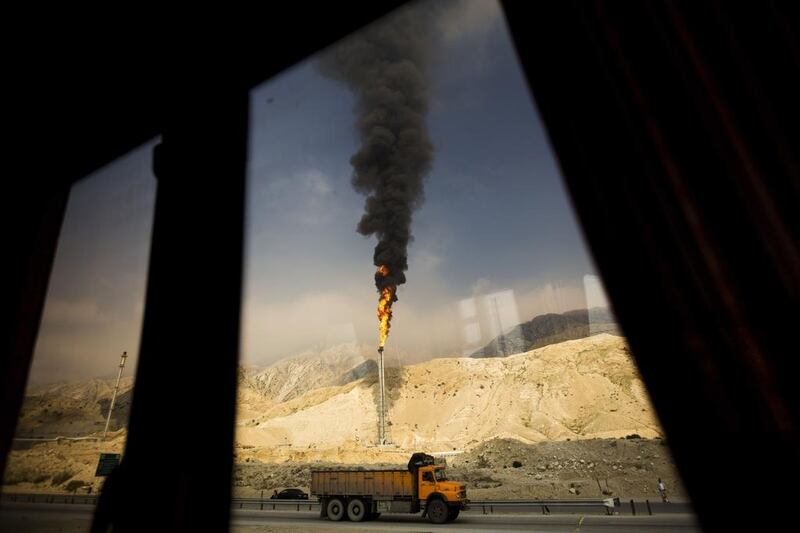ASALUYEH, IRAN // In the mountains north of the Iranian port of Asaluyeh, where huge torches of burning gas illuminate the roads, workers on a vast energy project sense that things are about to change.
Iran is hopeful that relief from international sanctions and unblocking of billions of its frozen assets under a landmark six-month nuclear deal will lead to the return of major oil companies to the South Pars oil and gasfield.
For Iran, which has had its economy battered by years of sanctions, the return of foreign energy companies would mean it could finally take full advantage of its vast natural resources.
Yesterday, Iran’s President Hassan Rouhani, met with leading oil companies at the World Economic Forum in Davos, Switzerland, and invited them to invest in his country’s oil and gas sector.
Most of the people working on the development blame international sanctions for long delays in the development of South Pars — part of the world’s biggest gasfield that Iran shares with Qatar. The delays have pushed Iran’s gas production far behind that of Qatar.
“The last group of foreigners working on the field ... were Koreans, who left Iran and the project four years ago,” said Mojtaba Zargar-Shoshtari, the head of one of the project’s phases.
Since work began in 2002 Iran has developed the field in 24 phases out of which only 10 are active and 14 are under development without any production.
But worked slowed over the past eight years as sanctions were increased against Iran’s nuclear programme.
Now 500 million cubic metres of natural gas are produced per day from South Pars, Mr Zargar-Shoshtari said. That figure is expected to dramatically increase if foreign companies return to the field and more phases are completed.
Frustration that the project had been delayed was clear among workers during a tour on Wednesday of the refineries and infrastructure being built on the mainland to process the oil and gas drilled offshore.
There was also a sense of pride that Iran’s oil ministry had managed to keep work going, in large part through the ingenuity of Iranians.
However, Iran would welcome the return of foreigners and their investments to speed up the final steps of the project.
“We produced almost all of the parts and equipment domestically, even those that we couldn’t import because of sanctions,” said Hamid-Reza Masoudi, the head of development plans at a phase that has 7,000 workers. “There are no foreign contractors currently in the project, but the return of foreign investments can definitely speed up our job.”
The head of another phase, Alireza Ebadi, said he needed equipment from EU countries such as Germany and the UK.
“Parts of the field still need some compressors that should be imported from Germany and [the] lift of sanctions will facilitate and speed up the project,” he said.
As part of the nuclear deal, which went into effect on Monday, Iran agreed to halt its 20 per cent enrichment programme, although it can continue enrichment up to 5 per cent.
In return, both the EU and US have suspended sanctions on the oil and petrochemical sectors and agreed to suspend sanctions that blocked foreign companies from providing services to Iran’s oil industry including insurance and transport. They also agreed to release US$4.2 billion (Dh15.43bn) of frozen Iranian assets.
Under the bright sun that burns workers’ skin even in the cool breeze of January, those working on the project near Asaluyeh believed that the return of Bijan Namdar Zanganeh to the post of oil minister had also provided a huge boost.
Just a month after the new moderate president, Mr Rouhani had appointed him in August 2013, Mr Zanganeh ordered the development of South Pars to be sped up.
He began monthly meetings with contractors, the workers said, allocated funds to finance the project and staged regular visits to Asaluyeh.
In December, while attending Opec’s Vienna meeting, Mr Zanganeh, said he wanted to bring major European and US oil companies such as Total, Shell, Statoil, BP, Eni, Chevron, ExxonMobil and ConocoPhillips into the country’s oil and gas sector.
“Since the beginning of the current administration the oil ministry has focused its efforts on the post-sanctions era,” Mr Zanganeh said, before leaving Tehran to Davos with Mr Rouhani.
“We have planned for a great volume of investment and technical activity in order to enhance recovery from oilfields and produce more oil and gas and to regain our deserved position in the global market. To this end, big international oil companies can play a role,” Mr Zanganeh said
foreign.desk@thenational.ae





